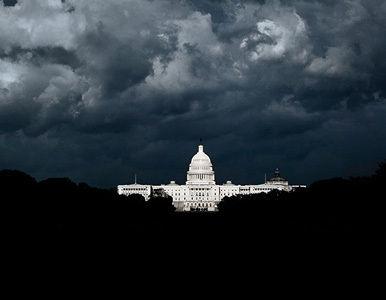
The consequences of three of the biggest political battles of the last four years are all converging over the next two weeks. With a polarized Congress and an intransigent Obama Administration, there is no clear path to settle the current debates over government spending, government debt, and ObamaCare. How does it end? With a bang or a whimper?
Narratively, events that begin to unfold today feel like the finale of a long-running mini-series. Politics in the last four years has been dominated by ObamaCare, government spending, and our national debt. Voter anxiety over these issues swept the GOP into a House majority in 2010 and has kept Obama’s approval ratings in the 40s throughout most of his time in office. Never before, however, have all three hit the headlines at the same time.
The government’s spending authority expires on September 30. If there isn’t an agreement to extend its spending authority by October 1, most of the government will shutdown. On that same day, the ObamaCare health care exchanges are set to open, setting in motion the full implementation of the law, three years after enactment. Just over two weeks after that, the government will reach its borrowing limit, necessitating an increase in the debt ceiling, or a possible default on our debt.
On Friday afternoon, the Senate will pass its version of a Continuing Resolution, providing a short-term extension of government spending. The Senate version will also reinstate funding for ObamaCare, which had been stripped out of the House-passed Continuing Resolution. It will send its version to the House and then leave town until Monday, the day the government’s spending authority expires.
The House then has a series of tough choices:
1. Pass Senate Resolution. The House could simply accept the Senate’s changes, pass the new resolution and move on to the debt ceiling debate. This is unlikely, as a large block of House Republicans, many elected as a result of ObamaCare, want at least changes to the law.
2. Amend the Senate Resolution. The current strategy in the House, which has changed several times over the past few days, seems to be to amend the Senate CR with language to remove the special Congressional exemption to ObamaCare. The House may also repeal the unpopular medical-devices tax in ObamaCare. The House would then send this to the Senate for its consideration.
Harry Reid has vowed to oppose anything but a “clean” resolution. When the Senate reconvenes on Monday, it will have just hours to consider any new language from the House. In this scenario, the government would likely shutdown, at least for a few days.
3. Amend the Senate Resolution, Pass a Short-Term Extension. The House could still add provisions dealing with ObamaCare to the Senate CR, but also pass a short-short term one or two week extension of spending authority. The Senate would be able to pass the short-short term resolution by unanimous consent and avoid a shutdown while it considers the new House language. Such a move, however, would more closely align the spending and debt debates.
Earlier this week, Speaker Boehner proposed an increase in the debt ceiling, tied to a one-year delay in ObamaCare. The move was to convince the GOP caucus that the fight over ObamaCare would continue and convince them to accept the Senate CR to avoid a shutdown.
Boehner even tried to sweeten the deal by adding a “christmas tree” of conservative legislative priorities. Since members realized most of those provisions would never survive a negotiation with the Senate, Boehner’s proposal wasn’t well-received. Congress will have to finalize the continuing resolution debate before it takes up the debt ceiling.
Boehner, however, has already won one victory in the current debate. The Senate drama over the ObamaCare debate overshadowed the fact that the House-passed resolution kept in place the sequester cuts, driving down discretionary spending to levels before Obama took office. Focusing on ObamaCare, the Senate didn’t even attempt to increase spending. So much for the idea that the House is in chaos.

COMMENTS
Please let us know if you're having issues with commenting.